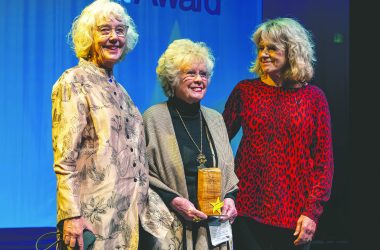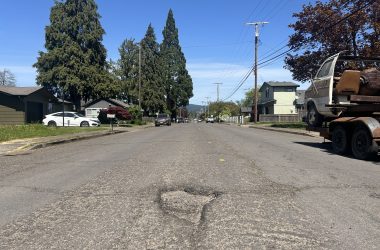CRESWELL – At the ripe old age of 19, when Richard Heyman began his flight training for the U.S. Army, he knew exactly what he wanted to do.
“They asked you to put down your preference, in order, if you’d rather fly cargo, bombers, or fighters,” Heyman said during a recent lunch at TJ’s. “I put down fighter pilot, fighter pilot, fighter pilot – and they never did catch it.”
Apparently, Heyman made his point. After graduating flight training school as a 2nd lieutenant, he spent virtually his entire career as a fighter pilot during three wars. After flying the iconic P-38s and P-51s during World War II, he flew A-26s in Korea, then in Vietnam he piloted the F-105.
“Thankfully, my career centered around flying practically all the time. A lot of people get to fly for four years, then it’s on to something else,” said Heyman, who flew planes for the entirety of his 32-year stay in the military. “I was fortunate to do that all the time. I had a hell of an interesting career.”
He’s lived one hell of a life, too, with so many honors and awards and achievements from those 32 years – the first five with the Army, the final 27 with the U.S. Air Force. (The Air Corps was part of the Army until 1947, then it became its own separate branch.)
Later this month, on May 25, retired Colonel Richard Heyman, Creswell’s eldest statesman, will be 99 years old. He’s still in good health, except for a nagging foot condition that requires him to walk with a cane now – the result of getting frozen feet while piloting an A-26 in Korea that had no heat. But up until a year ago, Heyman was playing golf once a week before foot circulation issues forced him to stop playing.
* * *
Memorial Day falls on May 29 this year, four days after Heyman’s birthday, and he says he always remembers his fallen comrades.
“There are so many people involved over so many years, I would recall personal things that happened when we were flying or something that would bring those people to mind more than Memorial Day,” Heyman said. “It wasn’t really a big holiday. I kind of think about my old buddies year-around more than one specific day.
“The first time I lost a couple of friends, really close friends, I wanted to go out and look for them. My commander said no, they’re down, and there’s nothing we can do for them, and that changed my thought patterns through the rest of my time flying bombers.”
Heyman said he always wanted to fly airplanes, but a career in the military? That never entered his mind – until that fateful day of Dec. 7, 1941.
“When the war started, I was a senior in high school, we were living in Oklahoma, and a bunch of us guys wanted to enlist right away,” Heyman recalled. “We went to the recruiting office, and they said to come back when I was 18. As soon as I graduated, my dad said he would sign papers for me after I graduated high school – which was no guarantee because I was not a good scholar. So as soon as I graduated, my dad signed the papers, I took the aviation test, and six months later I started my cadet training in June, and then my preflight training in October.”
He finished his cadet training in one year, graduating as a 2nd lieutenant in June 1943, just two months after his 19th birthday.
“I always wanted to fly an airplane, but the military wasn’t part of the equation,” Heyman said. “Then everything changed after Pearl Harbor. It never occurred to me that I’d go into the military. Military had nothing to do with it unti Pearl Harbor, and then everything changed. The mentality … and not knowing what you’re going to do. They were only drafting 21-year-olds, they weren’t drafting 18-year-olds, and I knew that was going to change, which it did.”
Fortunately for Heyman, he got to keep his favorite seat – in the cockpit.
“Thankfully, my career centered around flying practically all the time. A lot of people get to fly for four years, then something else. I was fortunate to do that all the time,” he said. “I had a hell of an interesting career. I even shot down an airplane at night while I was flying a bomber in Korea.
Time magazine did a piece (called ‘Crimson Sky’) on that. I happened to catch him in a little moonlight. We called it ‘Checkpoint Charlie.’ … It was a canvas-covered airplane – he had been harassing the ground troops at night, keeping them awake – I took a lot of ribbing over that.”
Heyman enjoyed the challenge of piloting fighters, which were used primarily to drive off enemy aircraft by gaining control of air space, as opposed to the larger bombers which are mainly designed to hit surface targets with missiles and bombs.
“The very first mission we flew was over northern France, then the next day was the first time the U.S. had flown directly over Berlin,” he said.
During wartime, Heyman only weighed about 120 pounds. But those hands! He always had the hands of a man twice his size.
“I had a wonderful career, very interesting. I was one of the first jet pilots in the country – I had this P-59, made by Bell – there were only about 50 of them made – and it was a terrible airplane. It had two engines, and they’d park it right next to the runway, and you’d get off the ground and get up to 10,000 feet, and ‘Whoops, better head back before we run out of fuel,’ and we’d have to come back because it couldn’t hold anything.”
* * *
Heyman got married early and had two children during his first marriage. The oldest, Michael, followed in his dad’s footsteps and is now a retired Major in California. Michelle, a retired nurse, lives in Phoenix.
Heyman was thrilled to be flying planes, but he had never visited Cloud 9 until he saw the love of his life, Barbara, again in 1960 during a visit to England.
“We had lost touch for a while, then reconnected about five years later,” Barbara said.
They got married that same year, then had a daughter (Sally) the next year, and a son (Martin) the following year.
Martin recently gave up his Mobile Glass Service business in Creswell after a highly successful 35-year career to be near his family in Searcy, Ark. Rather than sell the business, he decided to close it down instead.
Sally is a retired teacher, having taught English literature in junior college. One of her three children, Amantha, is now teaching, too.
There are those who would say that anybody who fought in three wars was unfortunate. Heyman would beg to differ.
“I can’t think of anything I would have rather done with my career,” said Heyman, who also shot down two planes during World War II, as well as the one in Korea. “That was what I wanted to be doing.”
Some guys can have it all. It truly has been a wonderful life for Richard Heyman.
All 99 years of it.








